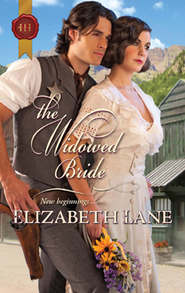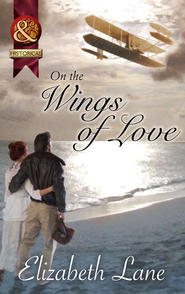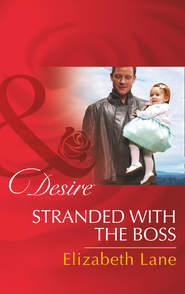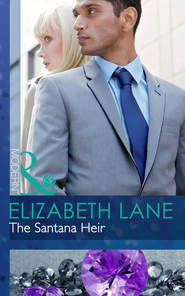По всем вопросам обращайтесь на: info@litportal.ru
(©) 2003-2024.
✖
His Substitute Bride
Настройки чтения
Размер шрифта
Высота строк
Поля
The first time Quint held his baby daughter, his heart had turned over. But even then he’d known what he needed to do. He had walked away, leaving his little girl to be raised in a happy home by the only father she’d ever known.
Much as it stung, Quint knew he’d done the right thing. The ranch was an ideal place to grow up. Judd and Hannah were devoted to their children and to each other. They allowed him to be involved in Clara’s life as her beloved, indulgent “uncle.”
It was all he could ask—and more than he likely deserved.
Annie’s eyes traced the outline of Quint’s broad shoulders as he lifted Clara onto a bench next to the rail. His unruly dark hair curled below the brim of his hat, brushing his collar in a way that made her want to reach out and stroke it with her fingertips. Nothing had changed. Quint was as compelling as ever. And she was just as fluttery and tonguetied as she’d been at fifteen, on the day she’d discovered she loved him.
It had been an April day, she recalled, under a bright Colorado sky. The hillsides were dotted with yellow buttercups and splashes of red Indian paintbrush. Returning birds staked out nesting territory with raucous calls.
With no promise of meat for the stewpot, Annie had loaded an old .22, the only gun her family owned, and set out for the hills to shoot a rabbit. Quint had come by an hour later, on his way home from seeing Hannah. Stopping his horse at a safe distance, he’d watched her plunking away at animals that wouldn’t hold still, missing every shot.
“So you’re the hunter of the family,” he’d teased.
“Somebody’s got to do it,” Annie had flung back. “Papa’s too tired. Mama’s too busy. Hannah’s too squeamish and Ephraim’s too young. That leaves me.”
“Not having much luck, are you?” he’d observed.
“That’s easy for you to say, Quint Seavers. When your family’s out of meat, all they have to do is butcher a steer. For us, it’s different. If you’re so smart why don’t you shoot one of these rabbits?”
“I can do better than that.” He’d swung off the horse and walked toward her. “I’ll teach you how to shoot one.”
And he had taught her—standing beside her, steadying her arm, showing her how to line up the bead in the notch and squeeze the trigger without jerking. His body had been warm through his flannel shirt, his hands soft and tough, like waxed saddle leather. His skin and hair had smelled of store-bought soap. She had breathed him into her senses, as if his essence could permeate every cell in her body.
By the afternoon’s end, Annie had shot two rabbits and lost her romantic young heart. Of course, she couldn’t let on. Quint was Hannah’s beau, and they would likely get married someday. But she could love him in secret, from a distance, like a maiden of old pining for Sir Galahad.
Over time she’d learned that Quint was no Galahad. He’d fathered Clara and broken her sister’s heart. She’d expected that would be enough to make her stop loving him. It wasn’t.
She was a grown woman now. But a glance from Quint could still turn her into a simpering teenager. On the train she’d felt strong and confident, ready to face him as an equal. Now, after two minutes with the man, her insides had turned to jelly. How was she going to manage a whole week without making a fool of herself?
Clara pressed against the rail, watching the water splash along the side of the ferry. “Is this the ocean?” she asked.
“This is just the bay. We’ll see the ocean later, maybe tomorrow.” Quint clasped her under the arms to keep her from leaning too far. “For now I have other plans. First we’ll stop by my flat to leave the bags and give you girls a chance to freshen up. Then we’ll go downtown to have lunch at Delmonico’s. How does that sound?”
“Delmonico’s?” Annie lifted an eyebrow as the cab began to move. “Goodness, I must say I’m impressed.”
“Where else would I go to show off the two loveliest ladies in San Francisco?”
“You were born with a silver tongue in your head, Quint Seavers. Such pretty words!” Did she sound clever or simply waspish?
“I make my living with words—some pretty, some not so pretty, but all true.” Quint settled back with one arm around his little girl. “How’s your sister?”
“Holding her own. The doctor says the baby’s doing fine. But Hannah doesn’t take well to bed rest. She’s not used to being idle.” A smile crept across Annie’s lips. “The last time we visited, she was sharing her bed with Daniel and Clara, two puppies, three dolls and a toy train!”
“That sounds like Hannah.”
“She’s the perfect mother.”
“I know—and Judd’s the perfect father.” Quint glanced down at Clara’s beribboned curls. “As for me, I’m doing my best to be a decent uncle.”
“You’re much more than that. Daniel loves the little trolley car you sent him. Maybe it’s time you had a family of your own, Quint.”
Quint shifted Clara onto his knee. “That’s a fine idea. But first I need to find the right sort of woman.”
“And what sort of woman would that be?” The minute she said it she regretted her words.
He hesitated. Her heart sank as she guessed the unspoken answer. Quint had never gotten over his lost love. That was why he’d never married. And that was one reason he was so devoted to Clara. The child was his souvenir, his own little piece of Hannah.
Maybe if she kept reminding herself of that, she could get through the week with her heart intact.
In no time at all they were docking at the ferry building with its impressive clock tower. Quint helped them ashore, saw to their luggage and summoned a horse-drawn cab. Soon they were traveling down Market Street, amid the wonders of San Francisco.
“Look, Uncle Quint! What’s that?” Clara pointed as a racing fire wagon, drawn by four horses, rounded the corner ahead of them. Bells clanged as they thundered closer. The cab driver pulled over to let them pass.
“They’re on their way to a fire,” Quint explained to the wide-eyed Clara. “That big tank on the wagon is the boiler for the steam pump. It helps them spray water to put the fire out.”
“Will they put it all out?”
“Let’s hope so. Sometimes we have bad fires here because the houses are close together and they’re mostly made of wood.”
“Is your house made of wood, Uncle Quint?”
He gave her a reassuring hug. “My apartment is in a nice brick building, so don’t you worry your pretty head. We’ll be fine there.”
As they chatted, Annie peered out the cab’s open side at the wonders of San Francisco. She’d been in Denver plenty of times to buy fabric and trim, but Denver was a backwater compared to this shining metropolis that throbbed with life and excitement. Buildings of stone and concrete towered around her like canyon walls. Traffic streamed by in a constant flood—horse-drawn cabs, wagons and buggies, new gasoline-powered autos and electric trolley cars that ran on tracks down the middle of the street.
And the people! Annie had never seen so many or so much variety. Vendors hawked their wares from carts on the sidewalks, everything from cabbages to gold watches and bright bolts of silk. Chinese men in dark, pajamalike garb, their heads crowned by black derby hats, darted among the crowds with burdens slung from poles on their shoulders. A gang of sailors jostled each other as a pretty, foreign-looking girl passed them. Two prosperous-looking businessmen stepped off a trolley and entered a bank.
Traffic sounds made a roar in Annie’s weary head. Right now she would gladly have traded lunch at Delmonico’s for a nice nap. But she knew Quint had planned the meal as a special treat. She would smile and do her best to enjoy it.
The stop at Quint’s apartment was brief, allowing for little more than hauling up the baggage and using the splendid porcelain facilities. They also met the smiling, middle-aged Chinese man called Chao, who worked as Quint’s cook and housekeeper.
The two-bedroom apartment was spacious and comfortable, with a brown leather settee and two matching chairs drawn up before the fireplace. The walls were paneled in walnut and sparsely but tastefully decorated with photographs Quint had taken on his visits to the ranch. There were shots of snow-covered peaks, willows in winter, the house, the barn, the cattle and the wagon loaded with hay. One picture showed Quint’s scruffy border collie, Pal, who’d lived into old age and passed on. Another showed a beautifully windblown Hannah on the porch with two-year-old Clara in her arms.
Annie couldn’t help wondering how Quint could afford such a place on a reporter’s salary. But then she remembered that he’d sold his share of the ranch to Judd and invested the proceeds. He would have all the money he needed. At the very least he could afford to take them to a nice lunch.
The name Delmonico’s had been synonymous with glamour and elegance for more than half a century. The San Francisco version was the most dazzling place Annie had ever seen. Glittering crystal chandeliers hung above what looked like acres of linen-covered tables decked with fresh flowers. Formally dressed waiters flitted among them, balancing silver trays the size of wagon wheels above the heads of the diners. Seated at a grand piano, a young black man played a tinkling waltz.
The waiter seated them at a table near a window and pulled out the brocade-covered chairs for Annie and Clara. Quint passed on their orders from the à la carte menu—braised chicken for Clara, poached salmon for Annie and a plate of oysters on half shell for himself. Then they waited for their orders, sipping fresh lemonade and nibbling from a platter of tiny crackers, smoked meats, pâtés and cheeses.
Clara’s ongoing chatter filled the need for conversation, allowing Annie to observe the diners. Most of the women wore skirts and jackets, beautifully cut and embellished with tucks and lavish embroidery. The fabrics almost made her drool—jewel-toned wools, raw silks, heart-stopping merinos and cashmeres, English tweeds to die for. And the hats! Merciful heaven, such hats! They were veritable museum pieces, piled with clouds of tulle, huge satin bows, artificial birds, sparkling jewels and jutting feathers. Annie had thought her own well-tailored suit and modest chapeau chic enough to wear anywhere. She had, in fact, been one of the most fashionable women on the train. But in this place she felt like a drab little country mouse.
“Why, Quint Seavers! What a surprise!” The speaker was a stunning woman with hair the color of a prairie sunset. She was dressed in a skirt and jacket of emerald silk bombazine, which looked costly enough to feed Annie’s mother, brothers and sisters for six months. A forward-curving black plume adorned her hat and framed one jade-colored eye.
“I missed you at the opening of my play,” she cooed. “You aren’t angry with me, are you, darling? After that awful scene at the club…”
“Not at all.” Quint rose. “Evelyn, I’d like you to meet Miss Annie Gustavson and my niece, Clara. Ladies, this is Evelyn Page, whose acting is the toast of San Francisco.”
Annie murmured a polite greeting. Ignoring her, Evelyn focused on Clara. “Your niece? What a delightful surprise! And she’s adorable! She looks enough like you to be your daughter!”











